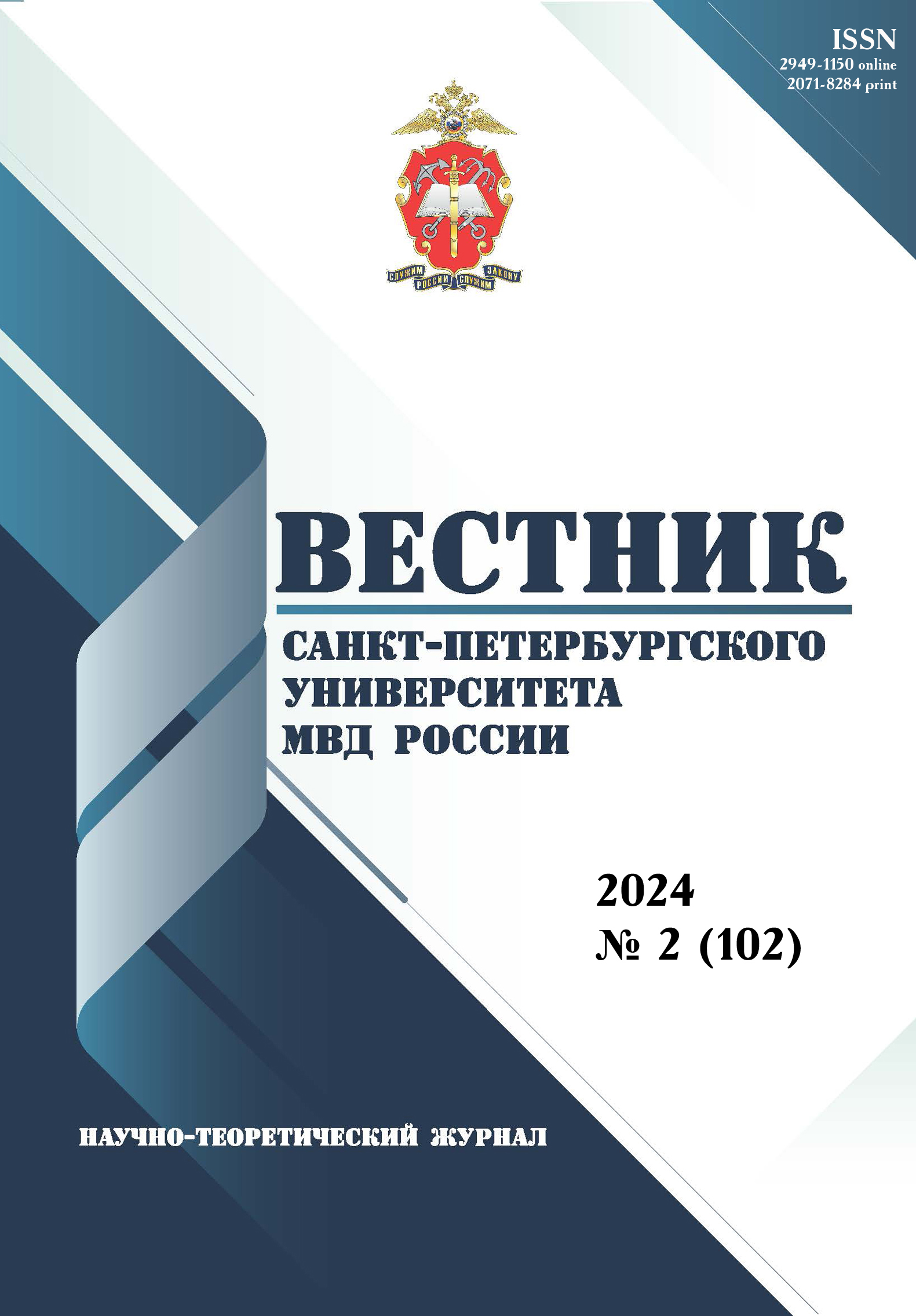Saint Petersburg University of the MIA of Russia (Department of Pedagogy and Psychology, Docent)
employee from 01.01.2011 to 01.01.2026
g. Sankt-Peterburg, St. Petersburg, Russian Federation
UDC 159.9.072
Introduction. The values being formed at the period of the professional training and study in the higher education institution have a significant impact on the formation of the subject’s meanings of educational activities, and the possibility of their conflict-free realisation determinates the state of psychological wellbeing. Differences of the individual’s ideas about the ways of realising the values, and also the domination of desires over the achievement motivation and the motivation of focusing on success determinate passivity in the realisation of value targets and psychological distress. The aim of study consisted of identifying the peculiarities and interrelationships of value factors providing cadets’ psychological wellbeing in the educational institution of the Ministry of Internal Affairs of Russia. Methods. In the study the general scientific methods were used, aimed at the collection, analysis, systematising and generalisation of data, also psycho-diagnostic method, methods of descriptive, comparative and correlation analyses with using Student t-criteria and Pearson correlation coefficient. The selection of study was introduced to the cadets having been trained in the higher education institution of the Ministry of Internal Affairs of Russia (n = 152), average age: 22,1 ± 1,1 years. Results. In the result of study it was established that representation of value factors in the complex of experience both the psychological wellbeing and the psychological distress, was determined practically with equal values. Differences between wellbeing and distress are provided with higher expression of values of developing yourself, spiritual satisfaction, values of public life spheres, training and education at the state of psychological wellbeing. During the study the dependence of the psychological wellbeing from the realisation of values was identified what is explained with multiple positive correlations between the value meanings and wellbeing At psychological distress the correlations between its meanings and the value meanings are characterised with negative links. The most significant criteria in the assessment of links between values and psychological wellbeing is not so the value factor as mechanism of their achievement reflecting general personality activity, the level of positive motivation, focus on success and personality maturity.
psychological wellbeing, happiness, serving, moral orientation, terminal values, value spheres, realisation of values, cadets, officers of law enforcement agencies
1. Komarova O. N., Rasskazova A. L. Tsennosti starsheklassnikov kak prediktory ikh psikhologicheskogo blagopoluchiya // Vestnik Moskovskogo informatsionno-tekhnologicheskogo universiteta – Moskovskogo arkhitekturno-stroitel’nogo instituta. – 2023. – № 1. – S. 140–149; https://doi.org/10.52470/2619046X_2023_1_140.
2. Leont’yev D. A. Tsennostnyye predstavleniya v individual’nom i gruppovom soznanii: vidy, determinanty i izmeneniya vo vremeni // Psikhologicheskoye obozreniye. – 1998. – № 1. – S. 13–25.
3. Leont’yev D. A. Schast’ye i sub”yektivnoye blagopoluchiye: k konstruirovaniyu ponyatiynogo polya // Monitoring obshchestvennogo mneniya : Ekonomicheskiye i sotsial’nyye peremeny. – 2020. – № 1. – S. 14–37; https://doi.org/10.14515/monitoring.2020.1.02.
4. Medvedev N. V. Kategoriya schast’ya v moral’noy filosofii Aristotelya // Istoricheskiye, filosofskiye, politicheskiye i yuridicheskiye nauki, kul’turologiya i iskusstvovedeniye. Voprosy teorii i praktiki. – 2016. – № 6-2 (68). – C. 125–131.
5. Dubrovina I. V. Fenomen «psikhologicheskoye blagopoluchiye» v kontekste sotsial’noy situatsii razvitiya // Vestnik prakticheskoy psikhologii obrazovaniya : setevoye izdaniye. – 2020. – T. 17. – № 3. – C. 9–21; https://doi.org/10.17759/bppe.2020170301.
6. Berzin B. Yu. Psikhologicheskoye blagopoluchiye lichnosti: k voprosu o sushchnosti ponyatiya // Izvestiya Ural’skogo federal’nogo universiteta. Seriya 1: Problemy obrazovaniya, nauki i kul’tury. – 2018. – T. 24. – № 4 (180). – S. 74–81.
7. Shevelenkova T. D., Fesenko P. P. Kontseptsiya psikhologicheskogo blagopoluchiya lichnosti i metodika yego issledovaniya / Novyye teoretiko-metodologicheskiye podkhody k issledovaniyu v klinicheskoy psikhologii : sbornik statey / red. T. D. Shevelenkova. – Moskva: Lev”, 2013. – S. 9–51.
8. Deyoung C. G., Tiberius V. Value Fulfillment from a Cybernetic Perspective: A New Psychological Theory of Well-Being // Personality and social psychology review. – 2022. – Vol. 27. – Issue 1; https://doi.org/10.1177/10888683221083777.
9. Kostina Ye. Yu., Orlova N. A., Panfilova A. O. Obraz blagopoluchiya v narrativakh zhiteley Dal’nego Vostoka: rezul’taty issledovatel’skogo proyekta // Monitoring obshchestvennogo mneniya : Ekonomicheskiye i sotsial’nyye peremeny. – 2020. – № 1. – S. 38–50; https://doi.org/10.14515/monitoring.2020.1.03.
10. Balabanova Ye. S. Tsennosti i resursy kak faktory sotsial’nogo blagopoluchiya spetsialistov rossiyskikh biznes-organizatsiy // Mir Rossii. – 2023. – T. 32. – № 1. – S. 6–36; https://doi.org/10.17323/1811-038X-2023-32-1-6-36.
11. Shuvalova N. V., Korepanova N. V. Issledovaniye tsennostnykh oriyentatsiy studencheskoy molodezhi kak faktora lichnostnogo rosta // Pedagogika i psikhologiya obrazovaniya. – 2022. – № 3. – S. 219–231; https://doi.org/10.31862/2500-297X-2022-3-219-231.
12. Khudyakova T. L., Borodovitsyna T. O. Vzaimosvyaz’ vedushchikh tsennostey lichnosti i komponentov psikhologicheskogo blagopoluchiya studentov razlichnykh profiley podgotovki // Vestnik Voronezhskogo gosudarstvennogo universiteta. Seriya: Problemy vysshego obrazovaniya. – 2021. – № 3. – S. 63–67.
13. Tsvetkov V. L., Ivanova A. I. Vzaimosvyaz’ tsennostey i bazovykh ubezhdeniy lichnosti kursantov s raznym urovnem emotsional’nogo blagopoluchiya // Vestnik Moskovskogo universiteta MVD Rossii. – 2020. – № 5. – S. 308–315; https://doi.org/10.24411/2073-0454-2020-10311.
14. Kanunnikov R. I. Faktory psikhologicheskogo blagopoluchiya sotrudnikov pravookhranitel’nykh organov // Mir pedagogiki i psikhologii. – 2024. – № 01 (90). – S. 204–210.
15. Gorbach N. A., Panyukova Yu. G., Panina Ye. N. Problemy psikhologicheskogo blagopoluchiya sotrudnikov OVD v usloviyakh professional’noy deyatel’nosti // Psikhopedagogika v pravookhranitel’nykh organakh. – 2008. – № 3 (34). – S. 3–6.
16. Tiberius V. Well-Being, Value Fulfillment, and Valuing Capacities / John J. Stuhr (ed.) : Philosophy and Human Flourishing. – Oxford University Press, 2023. – P. 118–C5.P72; https://doi.org/https://doi.org/10.1093/oso/9780197622162.003.0006.
17. Hanel P., Tunç H., Bhasin D., Litzellachner L., Maio G. Value Fulfilment and Well-Being: Clarifying Directions over Time // Journal of Personality. – 2023. – 00. – P. 1–13; https://doi.org/10.1111/jopy.12869.
18. Brunstein J. C., Schultheiss O. C., Grässmann R. Personal goals and emotional well-being: The moderating role of motive dispositions // Journal of Personality and Social Psychology. – 1998. – Vol. 75. – No 2. – P. 494–508; https://doi.org/10.1037/0022-3514.75.2.494.















